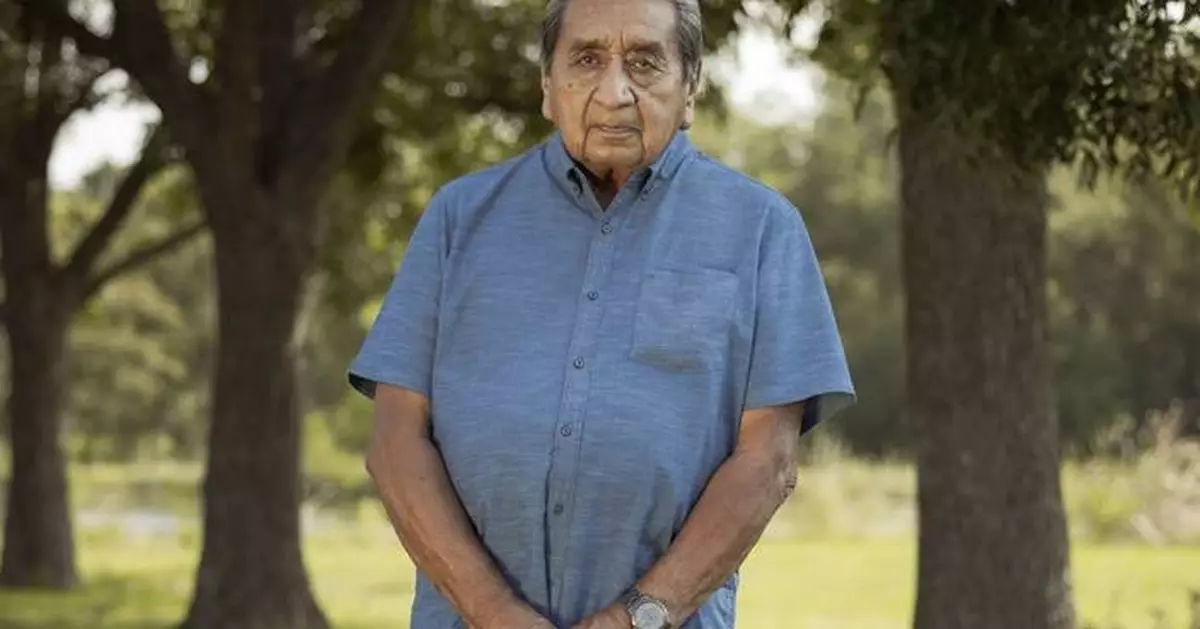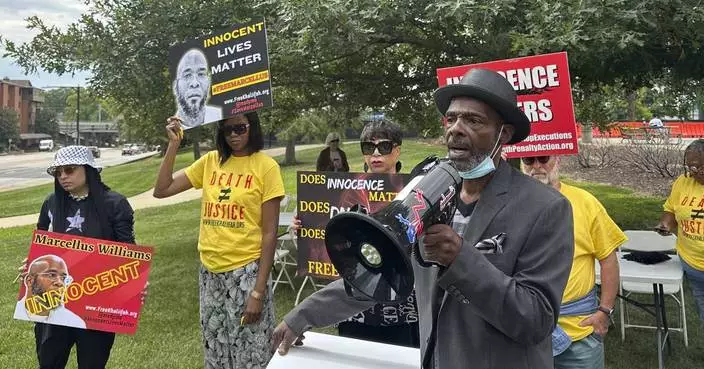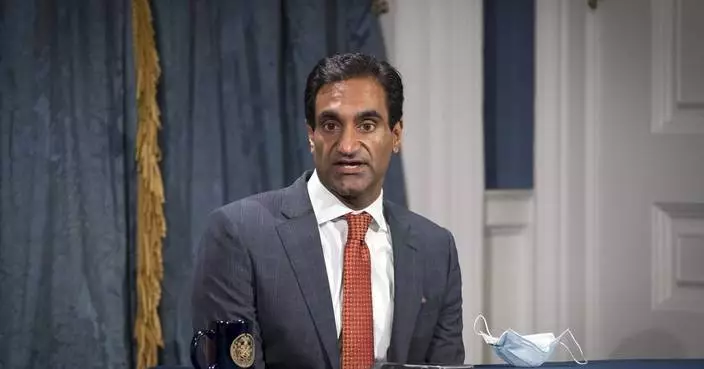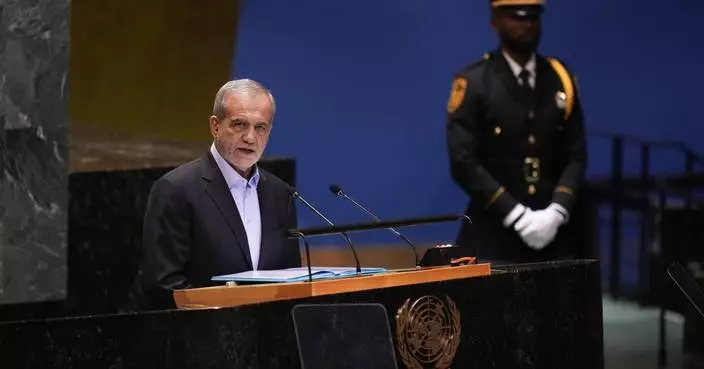WETUMPKA, Ala. (AP) — At the height of Muscogee power, thousands of people filled the tribe’s sprawling territory on the lush banks of the Coosa River in present-day Alabama.
Oce Vpofv, or Hickory Ground, was a town, a ceremonial site, burial ground, and the last tribal capital before the Muscogee people were forcibly removed from the Southeast to Oklahoma on the Trail of Tears.
Today in its place, the Wind Creek Casino and Hotel rises 20 stories above the winding river. The development is at the center of a long-simmering dispute between two tribal nations. The Muscogee Nation are descendants of people who called the land home and Alabama’s Poarch Band of Creek Indians is a separate tribal nation that shares ancestry with the Muscogee and built the casino after gaining ownership of the site.
The Muscogee Nation contends that Alabama’s Poarch Creeks do not have historic ties to Hickory Ground and illegally excavated the remains of Muscogee ancestors to build the $246 million casino. The Poarch Band maintains that it too has ancestral ties to Hickory Ground and has worked to preserve much of the historic site. The excavation of the graves and development at the historic site has fueled a dispute that has devastated the relationship between two tribal nations. Their historic link has only exacerbated the deep sense of betrayal that Muscogee in Oklahoma feel over the development of what was their tribal capital.
“They dug up my ancestors, put them in boxes, and built a casino directly on top of my family’s burial ground,” said George Thompson, a Mekko, or traditional chief in the Muscogee Nation.
The Atlanta-based 11th U.S. Circuit Court of Appeals will hear oral arguments on Wednesday in the Muscogee Nation’s appeal of the dismissal of a lawsuit challenging the casino’s construction. The lawsuit also names federal officials and the university that performed archeology work at the site.
The 85,000-square-foot casino and the long-running legal dispute accompanying it underscore how colonization has reshaped the lives of the Muscogee people, and the limits of the modern U.S. legal system in addressing tribal grievances.
Once among the largest tribal nations in the Southeast, the Muscogee territory includes parts of the present-day states of Alabama, Florida, Georgia and South Carolina. After passing the Indian Removal Act in 1830, the U.S. forced the Muscogee people to leave their capital. The Muscogee collected ashes from their most sacred ceremonial fire in Hickory Ground and carried them on the Trail of Tears to Indian Territory, present-day Oklahoma. There, they placed them in the fire of a new ceremonial grounds, one of several that still burn today. Left behind were the graves of their ancestors, to return to nature as intended.
A few Muscogee families from about 130 miles south of Wetumpka were allowed to stay, some because they fought alongside the U.S. during the Creek War from 1813 to 1814. Their descendants would later form the Poarch Band of Creek Indians.
The Poarch Band acquired a portion of the Hickory Ground in 1980 with the help of a historic preservation grant. The title transfer included a 20-year preservation covenant to protect the integrity of the site.
“The Creek people in Oklahoma pride in heritage and ties to original homeland can only be enhanced. There is still an existing Hickory Ground tribal town in Oklahoma. They will be pleased to know their home in Alabama is being preserved,” the Poarch Band wrote in a 1980 letter to an Alabama state agency requesting preservation grant funds. The Poarch Band acquired federal recognition in 1984 with the support of their Oklahoma cousins.
Then a fight began over development of the land.
Members of the Poarch Band dispute the Muscogee accusations, saying they too have ancestral ties to Hickory Ground and that their work protected key parts of the historic site such as the ceremonial ground found during the university's archeological study.
“We couldn’t control what had already been done with the land, but we did preserve the sacred grounds and 17 acres around it,” said Stephanie A. Bryan, tribal chair and CEO of the Poarch Band of Creek Indians.
Bryan said while the dispute dates back long before she became tribal chair, that the Poarch have tried unsuccessfully to reach an agreement with their Oklahoma cousins.
She called the appeal “an attack on our sovereignty,” saying that one tribal nation is trying to tell another what to do on its land.
“I’m very passionate about Creek history and the sacrifices that our ancestors made to be where we are today, and for another tribe to attack a tribe’s sovereignty is not the way we can grow together in Indian Country. It saddens me,” Bryan said.
Poarch Band officials say they decided to proceed with the reinterment of excavated remains in 2012 after no agreement could be reached between the two tribal nations.
While Muscogee believe that not all remains have been returned and may be languishing in boxes, Bryan said “all of the remains that the Poarch Band of Creek Indians have received have been reinterred.”
Thompson said they were not consulted about that reburial.
Lawyers for Auburn University wrote in court filings that the university is neutral in the dispute between the two tribes and will follow whatever the court decides.
The federal office for the Native American Graves Protection and Repatriation Act says that the law doesn’t address the excavation of ancestral remains on land controlled by one tribal nation but historically linked to another. Several tribal nations across the country were forcibly removed from their homelands, and in some cases a different tribal nation would later come to control them. In comments to the federal office, other tribal nations have expressed concerns a similar situation could happen to them.
“No one ever thought when they were writing NAGPRA that another tribe would do this,” said Muscogee Secretary of Culture and Humanities RaeLynn Butler.
The fight could soon see a skirmish in Congress. The Poarch Band is currently supporting a bill by Alabama Congressman Jerry Carl that would offer the tribe a way around a 2009 U.S. Supreme Court decision that found only tribes with federal recognition by 1934 could put land into trust for tribal use, such as casinos. The Muscogee Nation and other tribal nations are opposing the legislation, alleging that it would hurt their legal case and other tribes seeking the same legal remedy. Carl disputes that.
The dispute over Hickory Ground has created widespread resentment among tribal citizens in Oklahoma, where “Poarch” is often considered a dirty word. Questioning the cultural or political validity of the Poarch Band is a common refrain at ceremonial grounds in the Muscogee Nation. The tribal council also passed a resolution rescinding its support for the Poarch Band’s federal recognition.
“They knew then what they wanted,” said Jeff Fife, a Tvstvnvke, or warrior, for Hickory Ground and chief of staff for Principal Chief of the Muscogee Nation.
“They didn’t want our language. They didn’t want our culture or tradition. They wanted money.”
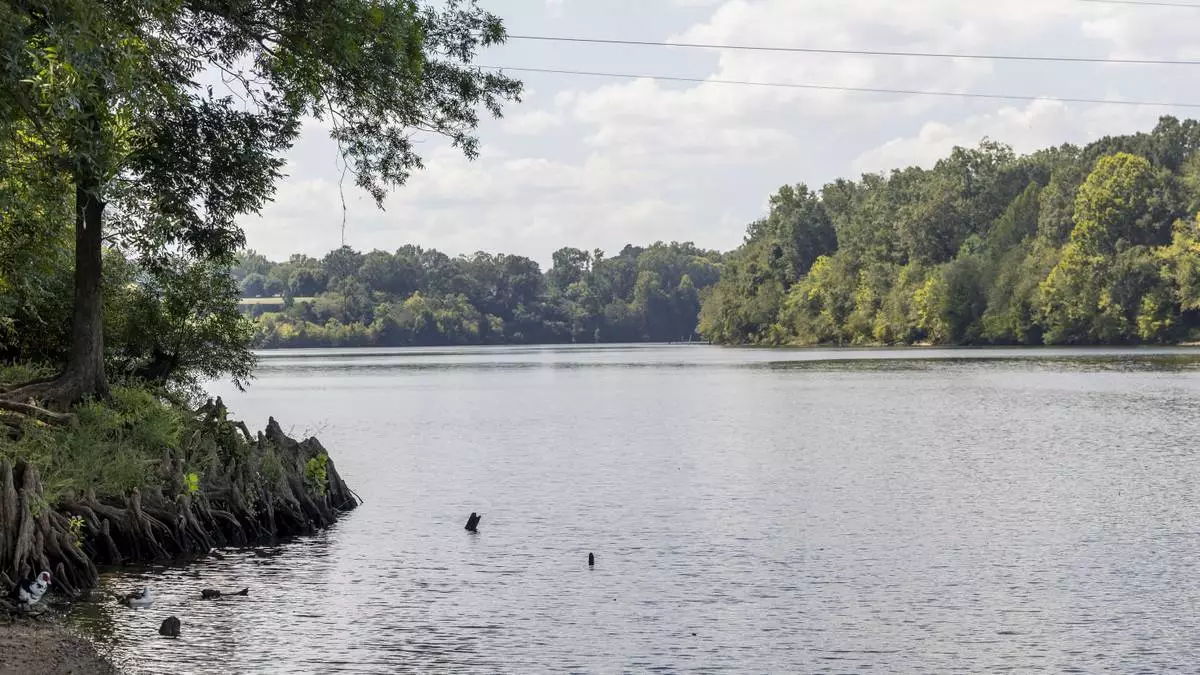
The Coosa River, Tuesday, Sept. 24, 2024, in Wetumoka, Ala. (AP Photo/Vasha Hunt)
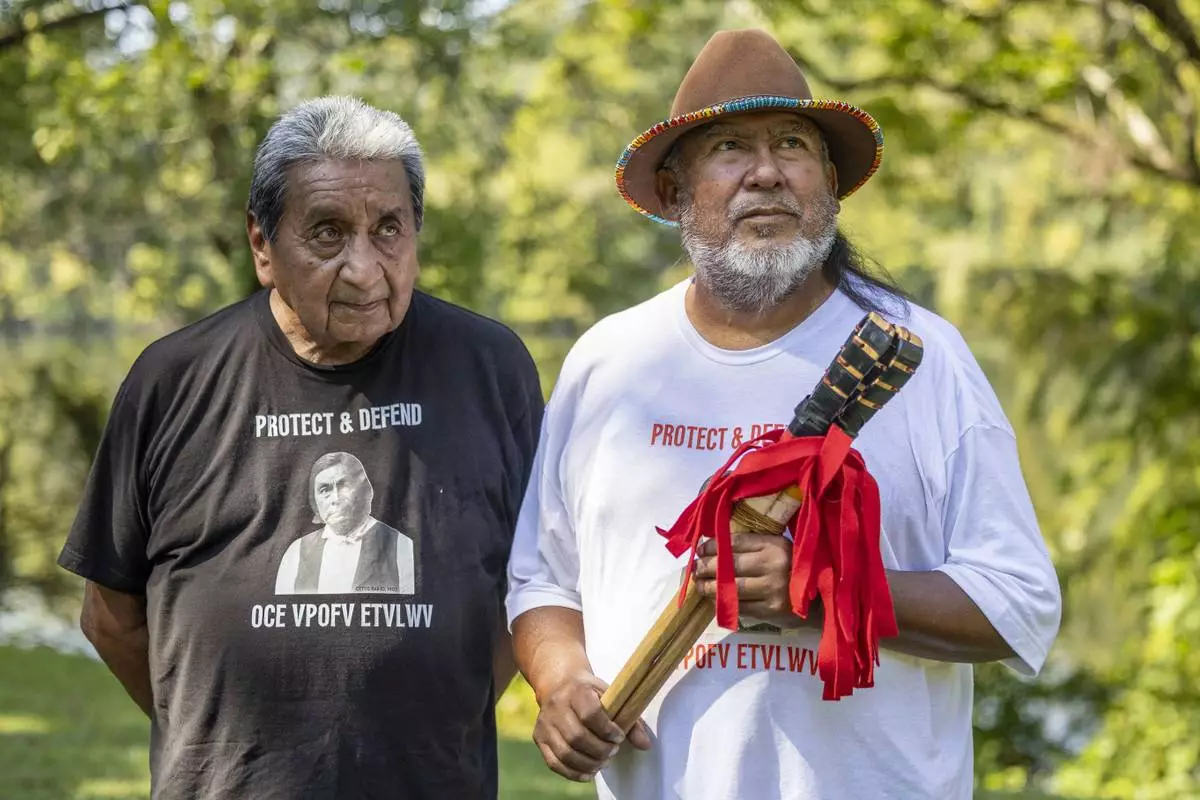
George Thompson, left, who is the Mekko, a ceremonial leader, of Hickory Ground in the Muscogee Nation, and Robyn Soweka Sr., of Hickory Ground Tribal Town, visited the Poarch Band tribe to challenge them to a game of stickball, a binding way of solving a dispute between tribes, Tuesday, Sept. 24, 2024, in Wetumoka, Ala. (AP Photo/Vasha Hunt)
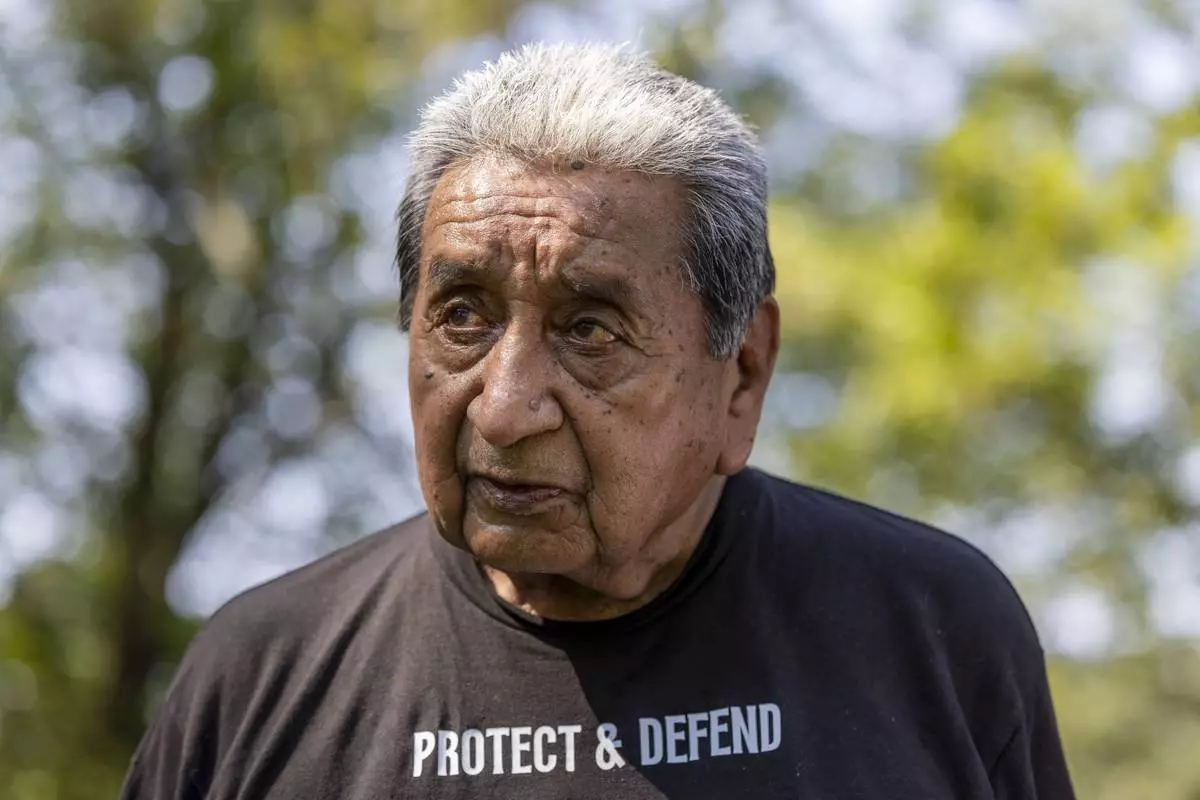
George Thompson, who is the Mekko, a ceremonial leader, of Hickory Ground in the Muscogee Nation, discusses the issues involving a dispute between the Muscogee Nation of Oklahoma and the Poarch Band of Alabama, Tuesday, Sept. 24, 2024, in Wetumoka, Ala.(AP Photo/Vasha Hunt)
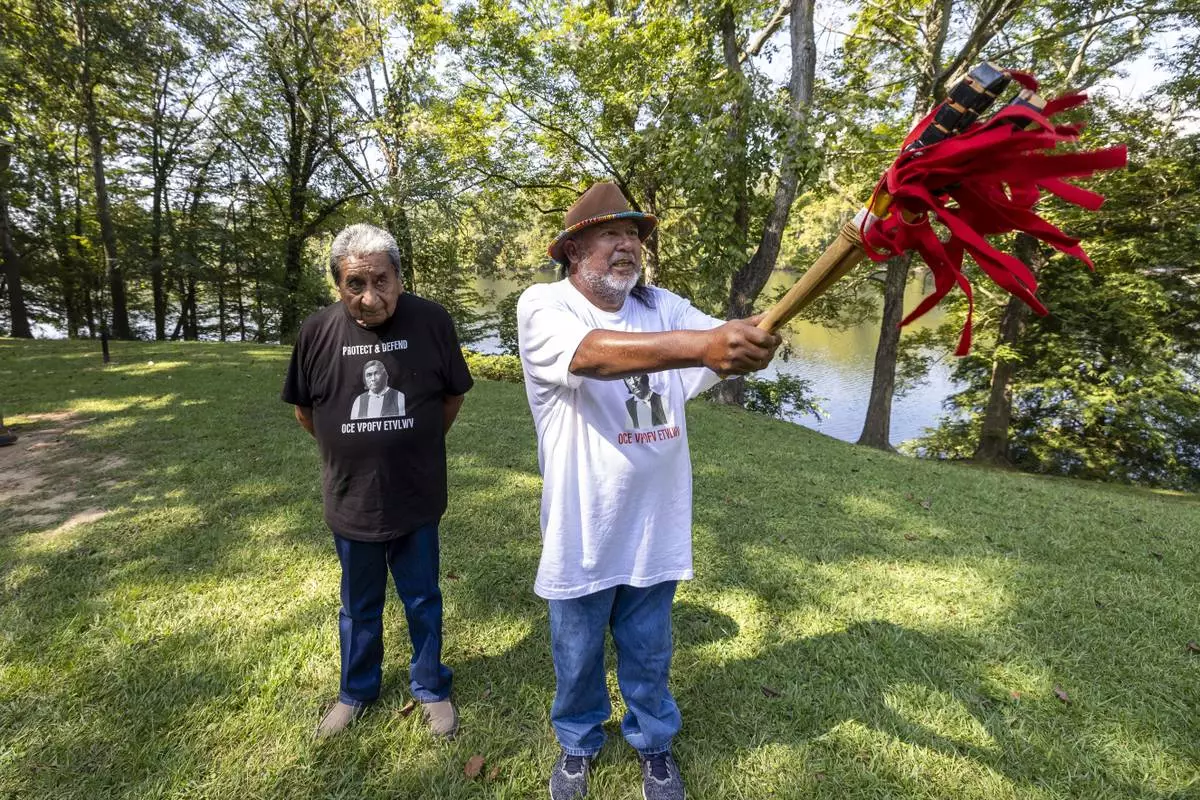
Robyn Soweka Sr., of Hickory Ground Tribal Town, right, describes a tribal challenge issued to the Poarch Band, Tuesday, Sept. 24, 2024, in Wetumoka, Ala. At left is George Thompson, who is the Mekko, a ceremonial leader, of Hickory Ground in the Muscogee Nation. (AP Photo/Vasha Hunt)
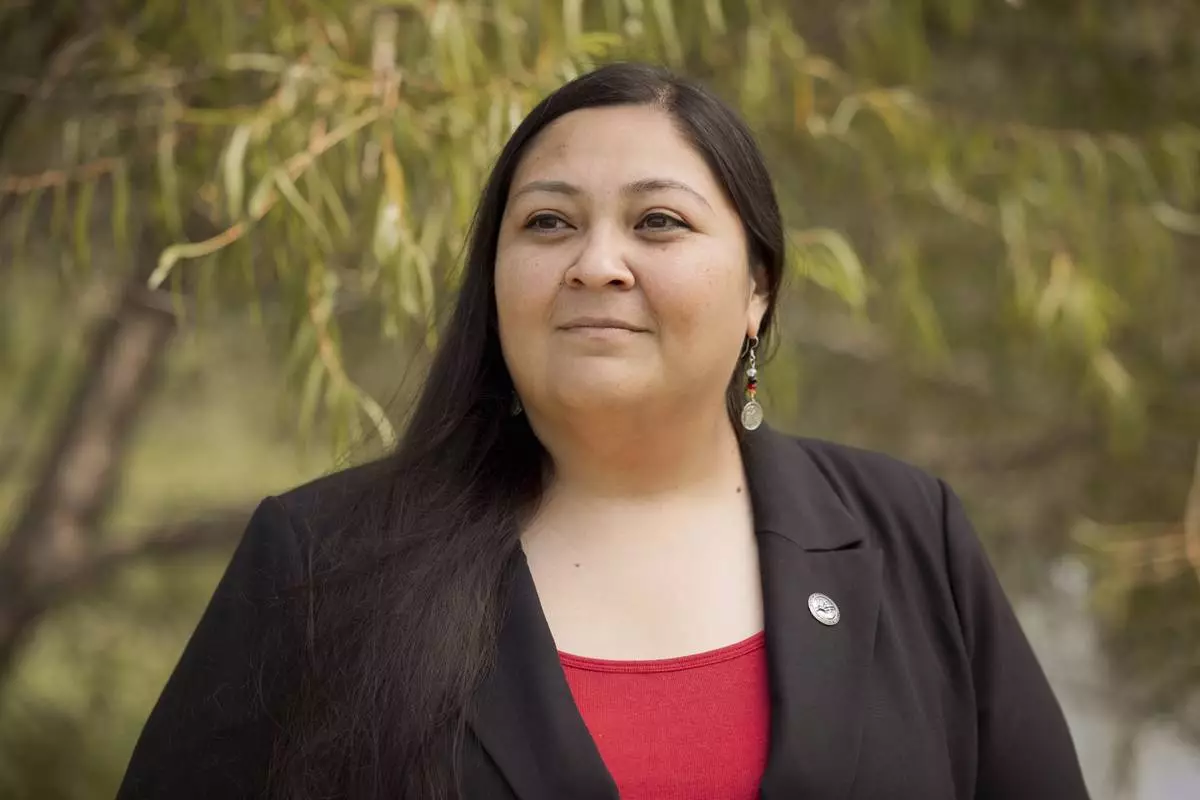
RaeLynn Butler, a Muscogee Nation citizen and one of its tribal historic preservation officers, poses for a photo, Aug. 21, 2024, in Okmulgee, Okla. (AP Photo/Brittany Bendabout)
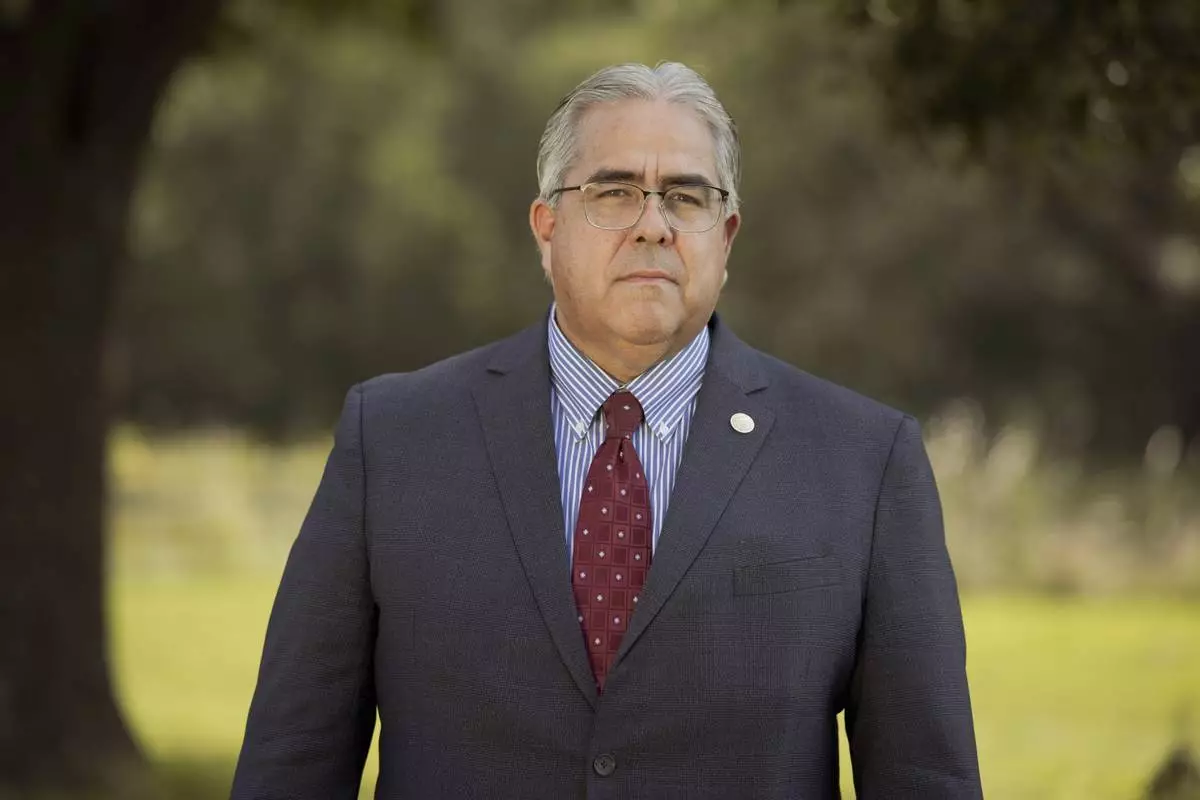
Jeff Fife, a Tvstvnvke, or warrior, for Hickory Ground and chief of staff for Principal Chief of the Muscogee Nation, poses for a photo, Aug. 21, 2024, in Okmulgee, Okla. (AP Photo/Brittany Bendabout)
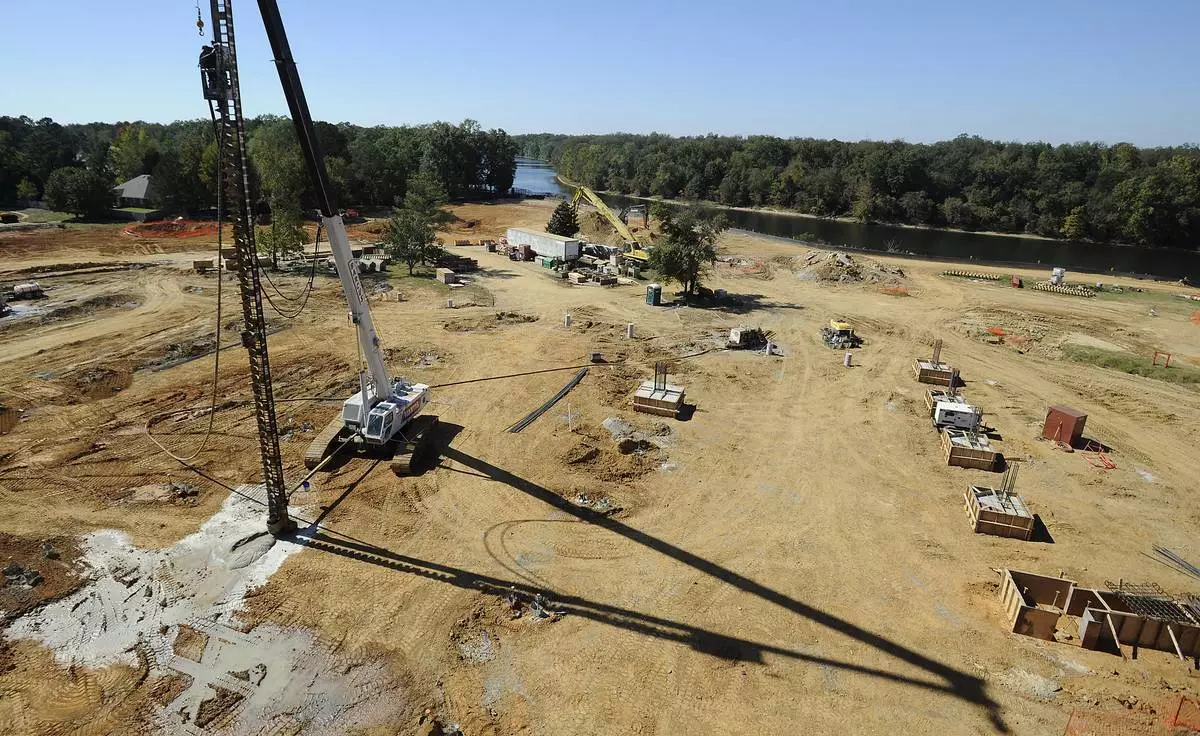
FILE - The construction of the Wind Creek Casino and Hotel is seen on Oct. 17, 2012, in Wetumpka, Ala. (AP Photo/Montgomery Advertiser, Mickey Welsh, File)

The Wind Creek Casino and Hotel is seen on Feb. 25, 2024, in Wetumpka, Ala., where the Oklahoma-based Muscogee (Creek) Nation contends Alabama's Poarch Band of Creek Indians broke their legal promise to preserve a historic Muscogee site when they acquired it in 1980. (AP Photo/Kim Chandler)

The Wind Creek Casino and Hotel is seen on Feb. 25, 2024, in Wetumpka, Ala., where the Oklahoma-based Muscogee (Creek) Nation contends Alabama's Poarch Band of Creek Indians broke their legal promise to preserve a historic Muscogee site when they acquired it in 1980. (AP Photo/Kim Chandler)

The Wind Creek Casino and Hotel overlooking the Coosa River is seen on Feb. 25, 2024, in Wetumpka, Ala., where the Oklahoma-based Muscogee (Creek) Nation contends Alabama's Poarch Band of Creek Indians broke their legal promise to preserve a historic Muscogee site when they acquired it in 1980. (AP Photo/Kim Chandler)
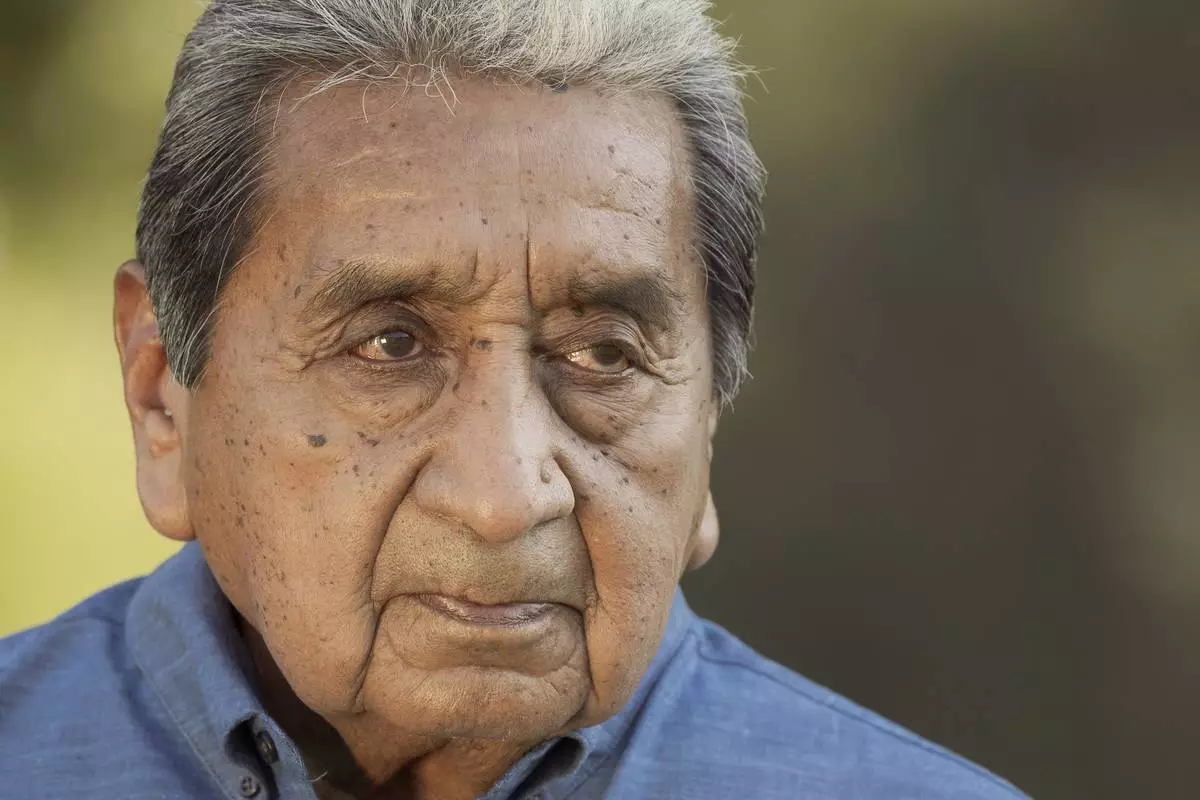
George Thompson, who is the Mekko, a ceremonial leader, of Hickory Ground in the Muscogee Nation poses for a photo, Aug. 21, 2024, in Okmulgee, Okla. (AP Photo/Brittany Bendabout)
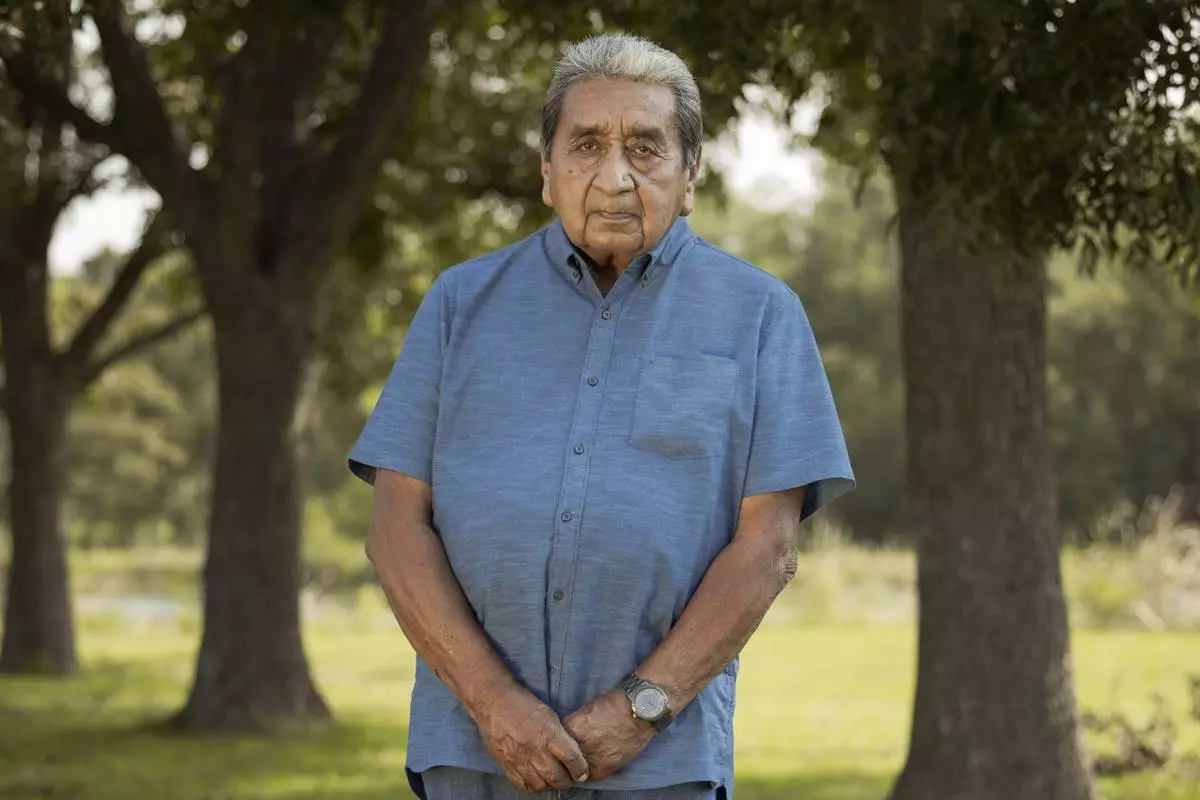
George Thompson, who is the Mekko, a ceremonial leader, of Hickory Ground in the Muscogee Nation poses for a photo, Aug. 21, 2024, in Okmulgee, Okla. (AP Photo/Brittany Bendabout)


